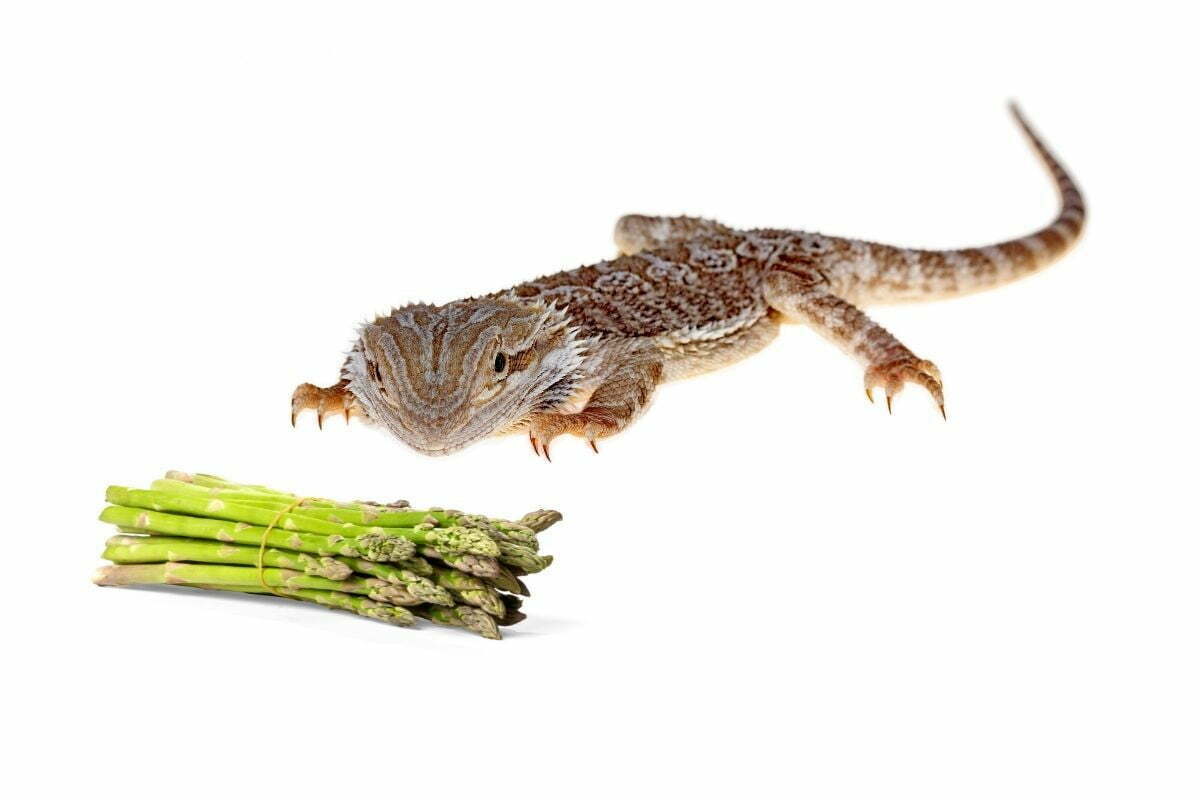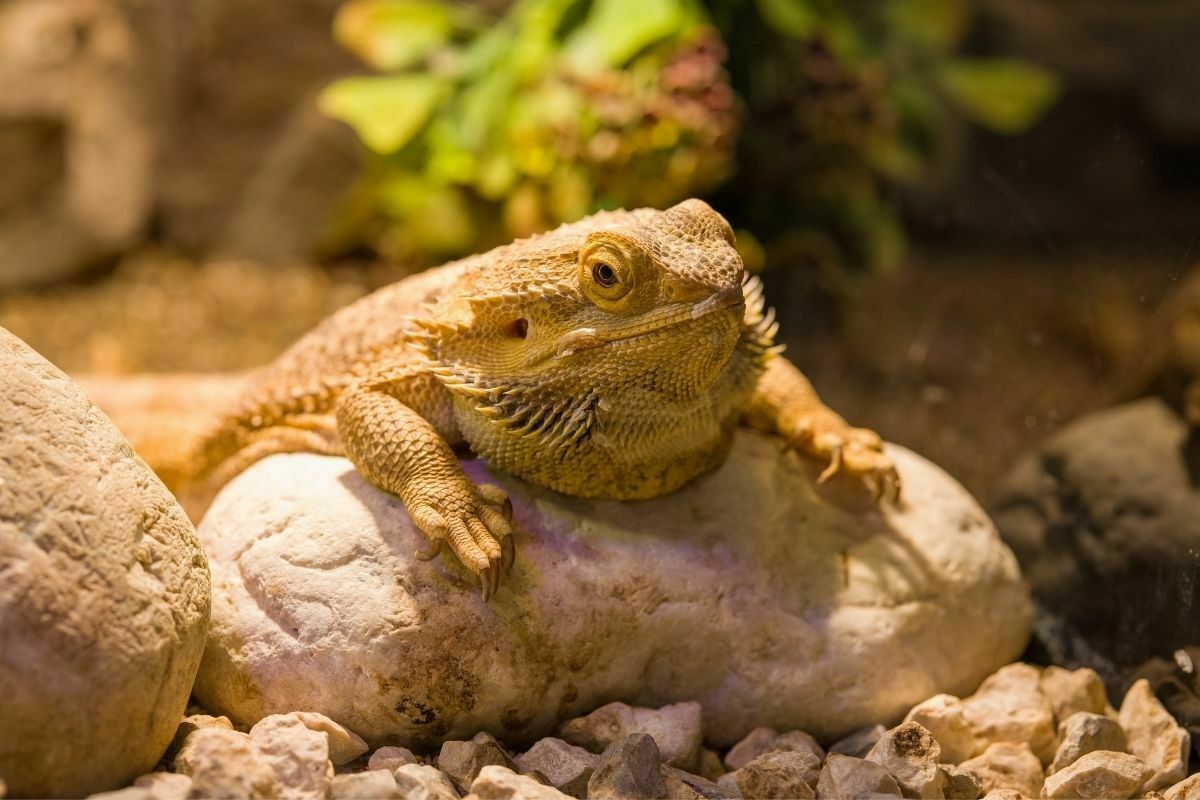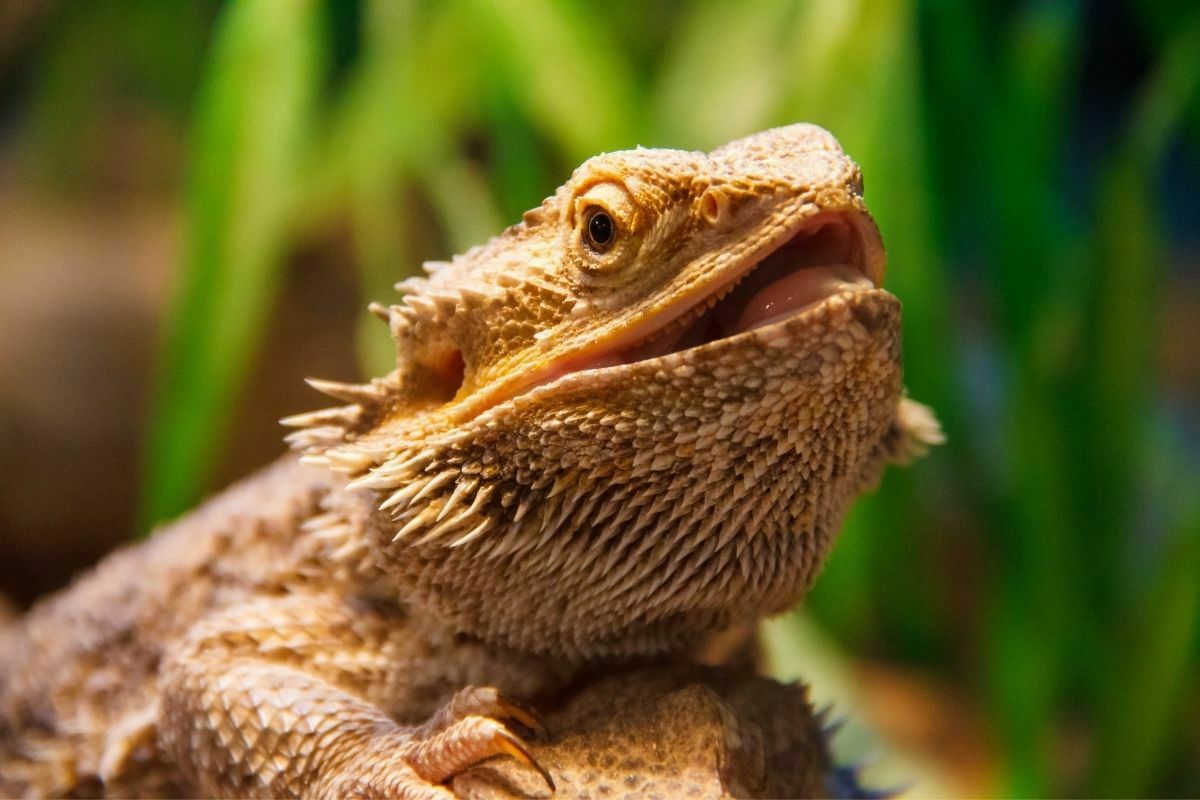Asparagus is a vegetable that has become very popular over the last decade. People love its taste and health benefits. Unfortunately, some animals don’t appreciate it at all. In fact, they can even cause harm to them.

Bearded dragons are reptiles that belong to the dragon family. They are native to Australia and New Guinea. Their diet consists mainly of insects and other invertebrates. These lizards also consume plants such as asparagus.
So, in short, a bearded dragon can eat asparagus. But if you want a slightly more in-depth answer, then we would recommend that you keep reading this article.
Not only will we cover all the key nutritional facts about asparagus, but we’ll also talk about how it will affect your reptile.
Asparagus – Nutritional Profile
The first thing that you should know about asparagus is that it contains a lot of nutrients. It’s an excellent source of vitamin K, potassium, fiber, protein, iron, calcium, and phosphates. This is a great food to feed a growing bearded dragon.
Here is the complete nutritional profile of your bearded dragon, so you can see what benefits your lizard gets from asparagus:
- Water: 93 grams
- Energy: 20 cals
- Protein: 2.2 grams
- Fat: 0.12 grams
- Carbs: 3.88 grams
- Fiber: 2.1 grams
- Sugars: 1.88 grams
- Calcium: 24 mg
- Phosphorus: 52 mg
- Sodium: 2 mg
- Vitamin C: 5.6 mg
- Iron: 2.14 mg
There are also plenty of other vitamins that asparagus contains that will be hugely beneficial for your lizard, helping it develop healthy bones and good skin.
Asparagus And Your Bearded Dragon – Is It Safe?
Now that we have covered the nutritional information on asparagus, let us now look at whether or not it is safe for your bearded dragon.
In general, most vegetables are perfectly fine for reptiles. They are a good source of vitamins, although you should feed this to your bearded dragon on its own. A lizard will need plenty of protein that it will only be able to get from insects.
However, it is worth going into all the pros and cons of giving your lizard this treat, as it will undoubtedly affect the delicate digestion of your lizard. So first, we’ll have a look at some of the pros of feeding asparagus to your bearded dragon.
The Pros Of Feeding Asparagus To Your Bearded Dragon
It is important to remember that asparagus isn’t just nutritious; it is also delicious. If you give your bearded dragon asparagus, it will enjoy eating it.
How vitamins and minerals affect human and lizard digestion is really not all that different. However, they do bisect in some important ways.
Asparagus has lots of vitamins A, K, E, and C. All these are very healthy for human and reptile bodies and should be a key component of a varied diet.
Finally, it is high in fiber which helps to keep things moving along smoothly. Fiber is especially important for reptiles because it helps them digest their food properly.
The Cons Of Giving Asparagus To Your Lizard

Although asparagus is a good addition to a bearded dragon’s diet, there are still some downsides. The main one is that it is quite hard to digest.
This means that your lizard may find it difficult to break down the tough fibers of the vegetable. This could cause problems with your bearded dragon’s digestive system.
Another problem with asparagus is that the stems contain oxalic acid. Oxalic acid is poisonous to lizards, but fortunately, it does not build up in the body like it would in humans.
Oxalic acid will also prevent essential nutrients such as calcium from being fully absorbed in the body. This will stop your lizard’s bones from growing healthy and strong.
If you want to give your bearded dragon asparagus, make sure that you cut off the ends of the stalks before you feed it. Otherwise, it might choke on the stalk.
If you don’t want to risk choking your lizard, then you should wait until it is older. By then, it will be more mature, with developed teeth that can handle tougher foods.
Asparagus And Oxalates
So, what about oxalic acid? What exactly is it? Well, oxalic acid is an organic compound found in plants. It is made up of carbon, hydrogen, oxygen, and nitrogen.
There are two types of oxalate: monocarboxylate and dicarboxylate. Monocarboxylate oxalates are the ones that pose the biggest threat to our bearded dragons.
They are present in many fruits and vegetables, including spinach, rhubarb, strawberries, parsley, potatoes, beans, peas, corn, wheat bran, oats, nuts, and seeds.
Asparagus Water Content
The water content of asparagus varies depending on where it comes from. In general, fresh asparagus contains around 80% water, while dried asparagus contains around 50%.
However, the amount of water in asparagus depends on how long it has been stored. The longer it has been stored, the less water it contains.
Asparagus Storage Tips
You should always store asparagus in a cool, dry place away from sunlight. You should also try to buy asparagus that hasn’t been sitting out too long.
You should also wash asparagus thoroughly before storing it. Make sure to remove any dirt or debris that may have gotten stuck between the leaves.
Asparagus Contains Little Calcium
Calcium is vital for bone growth in reptiles. However, asparagus doesn’t contain much of this essential vitamin.
It only contains about 24 mg of calcium per 100 grams of asparagus. That’s why you need to supplement your bearded dragon’s diet with other sources of calcium.
You can add calcium to your lizard’s diet by including it as a supplement. It is available in a powder or a liquid form to help your animal take it on in the first place.
You’ll have to be wary of feeding your dragon too much of this food, as they only have small stomachs, which can affect the amount of calcium that they absorb into their bloodstream.
Foods like kale have large amounts of calcium and a decent balance of calcium and phosphates. Phosphates help calcium absorb better into the body.
This plant has a high concentration of potassium, which helps keep the kidneys functioning properly. Potassium also helps regulate fluid levels in the body.
Asparagus Is Not A Good Source Of Protein
Bearded dragons do not require protein supplements because they get all the protein that they need from their normal diets.
Bearded dragons are omnivores, meaning that they eat both meat and plant-based foods. They usually eat insects and worms when they’re young, but as they grow bigger, they start eating more meaty foods.
Preparing Asparagus For Your Bearded Dragon’s Dinner

When preparing asparagus for your bearded dragon, make sure that you cut off the tough ends of the stalks. This will prevent them from getting caught in your beardie’s teeth.
If you want to cook asparagus, boil it until tender. Then drain it and serve it to your lizard.
However, you can feed raw asparagus to your bearded dragon, as this will be a great method of absorbing as many nutrients as possible. You can either chop up the spears into smaller pieces or leave them whole.
Wash Your Asparagus
Before serving your reptile asparagus, make sure that you’ve washed it well. Remove any dirt or debris that might have gotten stuck in the leaves.
This will also help you to remove any parasites. Parasites can cause serious health problems for your bearded dragon.
Which Is Better: Organic Or Processed Asparagus?
Organic asparagus is considered superior to processed asparagus. The reason behind this is that organic asparagus is grown without pesticides.
Pesticides can harm your bearded dragon if they end up in its system. Pesticide residue can lead to illness and even death.
Pesticides are also harmful to humans who consume these plants. If you want to ensure that you’re giving your bearded dragon the best quality food, then opt for organic produce.
Is Cooking Asparagus Better?
Yes, cooking asparagus will actually help to reduce the amount of oxalic acid that you get in it. As we mentioned before, this acid will actually prevent the maximum level of nutrient absorption.
However, cooking the asparagus will also lower the mineral and vitamin content. So this will all depend on whether you value more nutrients across the board or you are specifically targeting the oxalates to reduce them in your lizard’s body.
You can always get the additional nutrients from other vegetables if you decide to make a little lizard salad for your bearded dragon (which we would recommend that you do).
Chopping Asparagus
The easiest way to chop asparagus is by using a sharp knife and cutting it lengthwise. Once you’ve done this, simply slice each piece crossways.
Alternatively, you can use an electric vegetable chopper. Just place the stalk between two blades and turn the machine on.
Chopping up your asparagus will prevent your lizard from choking. It will also allow him to chew better.
Can You Feed Your Bearded Dragon Raw Vegetables?
Raw vegetables are fine for your bearded dragon. However, you should only give it small amounts at first.
Your lizard needs time to adjust to eating new foods. Make sure that you don’t overfeed it.
It’s important to note that some reptiles may not like certain types of vegetables.
Do Bearded Dragons Enjoy Eating Asparagus?
Bearded dragons enjoy eating asparagus. They love the crunchy texture and the fresh taste.
As long as you keep their diet varied, they’ll thrive.
Asparagus is one of the most popular vegetables that lizards like to eat. This makes sense because it’s high in fiber and minerals.
How Often Should Your Bearded Dragon Eat Asparagus?
You need to feed your bearded dragon asparagus every 2-4 weeks, making sure that they have only a small portion of this vegetable.
If you stop feeding it for too long, it could start losing weight. This is especially true if you’ve been feeding it a lot of different foods.
When you first introduce asparagus into your bearded dragon’s diet, you should feed it about 1/3 cup per day.
This will gradually increase until you reach a full cup.
You should make sure that you keep the level of asparagus down to a minimum, as it has a high number of oxalates that will negatively affect the muscle and bone composition of your bearded dragon.
Can A Young Bearded Dragon Eat Asparagus?

A young bearded dragon can be fed asparagus. The younger he is, the more likely he is to choke on it.
So, when you first introduce it to his diet, you should limit the amount that he eats.
Once he gets used to it, you can slowly increase the amount that he consumes. This will also be a good way of winning your lizard round if, at first, he doesn’t take to the asparagus.
If you mix your asparagus in with other vegetables, then this is also another great method of broadening its palate and getting more nutrients into its diet.
Other Vegetables That You Can Feed Your Bearded Dragon
There are many other vegetables that you can add to your bearded dragon’s diet. Here are just a few:
- Spinach
- Broccoli
- Celery
- Green beans
- Kale
- Sweet potato
- Swiss Chard
- Cabbage
- Mustard Greens
- Dandelion Greens
These vegetables have great nutritional value and can easily replace asparagus to give your reptile a much broader palate of minerals.
Kale is very high in calcium, whereas mustard greens have a larger protein content than other vegetables.
What Is The Bearded Dragon’s Typical Diet?
The typical diet of a bearded dragon consists of insects, worms, crickets, earthworms, snails, slugs, spiders, flies, ants, grasshoppers, cockroaches, beetles, centipedes, moths, and butterflies. It is more common that your lizard will eat this in the wild.
However, there are times when he might choose to eat from your hand or even a bowl of food.
He will also consume any fruits that you offer him. However, these are usually limited to apples, bananas, and grapes. Fruits contain a lot of sugars that might lead your reptile to become obese.
In addition, some reptiles may not like certain fruits, such as citrus fruit. So, you should always check before offering them to your bearded dragon.
Bearded dragons also like veggies. They enjoy green leafy vegetables, broccoli, spinach, cabbage, kale, and cauliflower.
Frequently Asked Questions
What Kind Of Food Do I Feed My Bearded Dragon?
There are lots of different types of food available, but the most popular ones are:
– Dry Food
– Pellets
– Crickets
– Worms
– Mealworms
– Insects
– Snail pellets
– Grasshopper nymphs
– Mealworms (for older lizards)
– Beetles
– Cockroach nymphs
– Ants
– Flies
How Often Should I Feed My Bearded Dragon?
Every day is fine. But older bearded dragons will want to eat less than younger bearded dragons. It is okay to feed an older bearded dragon once every two days.
Do All Bearded Dragons Need Fresh Food?
No. Some bearded dragons will eat dry foods, while others prefer wet foods. You can try both if you don’t know which one you have.
How Long Does A Bearded Dragon Live?
A bearded dragon lives for about 10 – 15 years.
Are Bearded Dragons Easy To Care For?
Yes, they are very easy to keep. All you need to do is provide them with enough space, a hideout, a water dish, and a suitable diet.
Can Bearded Dragons Hibernate?
Yes, they can brumate (the cold-blooded animal version of hibernation) during the winter months. Just make sure that they get plenty of sunlight so that their skin can absorb vitamin D.
Our Final Say
The bearded dragon is an amazing animal that requires minimal maintenance and attention. They are extremely intelligent and social creatures who are eager to learn new things.
They are also very friendly animals and will gladly accept affection from people. We hope that our guide to this creature’s diet has helped you decide what best to feed them.
